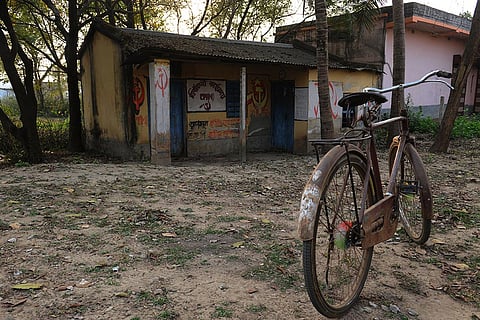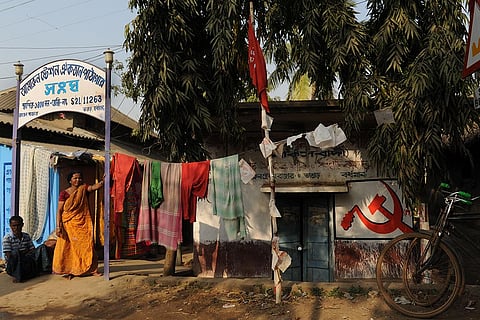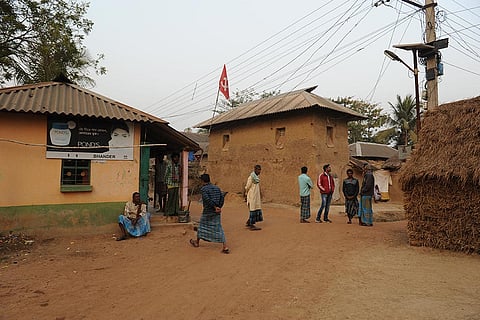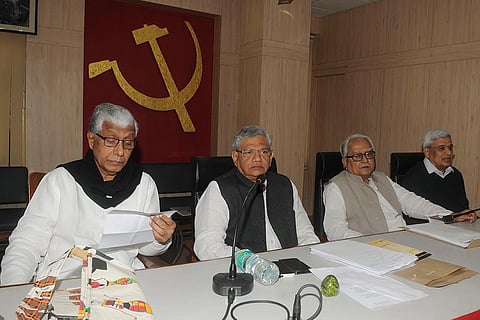A standard ritual marks Madhu Mallick’s start of day. At the crack of dawn, the 37-year-old lights the clay stove, boils milk with water and puts tea-leaves into it. That would ready the piping-hot brew for his morning customers who begin arriving at the shop. It’s an open brick-and-cement structure at the far end of his mud hut in the police district of Jangipara in south-central West Bengal. To be precise, on the side of the highway at the crossing of three villages: Mohanbati, Majhipara and Gayapara, in Hooghly district. There, Madhu’s Teashop, according its owner, “is a silent witness” to the political change that swept through the state when, seven years ago, the mighty Communists faced defeat after ruling the state uninterruptedly for three-and-a-half decades.
Where Party Has Withered Away
A tie-up with Congress would have yielded zilch, given the total absence of CPI(M) cadres in the Bengal countryside
Jangipara was one of those famed political constituencies during these long 34 years. Not once did it elect someone outside of the Left. Be the election for the civic body, state assembly or the country’s Parliament, the winner was always from the CPI(M) or one of its political partners. “Yes, earlier these parts were dominated by the Communists,” nods Mallick in agreement.

Deserted party office in Burdwan
The local leaders and party workers, who sat on the wooden benches outside his stall, drank tea and chatted—all of them belonged to the Red brigade. Then, as if overnight, on a muggy May day in 2011, as new chief minister Mamata Banerjee took oath in Calcutta, the entire area turned green: the colour of the now-ruling party, Trinamool Congress.
According to locals, since then, in these past seven years, anyone would be hard put to locate a single CPI(M) supporter, forget leader, cadre or worker.
After the Marxist party’s rout in the 2011 elections, rival political party workers vengefully hunted down Left supporters and hounded them out of their homes and villages. Fearing such a fallout, Trinamool supremo and chief minister Mamata Banerjee had issued a statement to her party workers that their motto should be “bodol chai, bodla noi” or “we want change, not vengeance”. In spite of such caveats, CPI(M) cadres were beaten up, leaders chased out, their party’s flags uprooted and offices vandalised. This prompted hundreds of the CPI(M) supporters to switch loyalties. Droves began getting absorbed into the Trinamool.
The CPI(M) office at Sitapur in Jangipara’s market area still stands testimony to such post-poll violence and vandalism. Its battered and broken windows and walls now serve as the backdrop of ad hoc stalls and shops run by rival political groups.
Some of them openly talk about the anger that triggered such violence.
It relates to a rot that had been nibbling away at the structure that had held the CPI(M) aloft for those 34 years. It’s an irony that the voices from this “mob” that attacked every symbol the CPI(M) stood for reveals: the people who had supposedly been keeping the party in power were actually seething with rage. That’s because the party—down to its district leaders, cadres and rank and file—was holding the democratic process to ransom. It’s immaterial whether or not members of the mob identified themselves with the new rulers.

A shanty there that was once CPM office doesn’t allow entry to comrades
“We were never allowed to cast our vote,” says a middle-ager, not keen to name himself. “Before any election, thugs would come to our villages, crash into houses and warn us of dire consequences if we even dared to go anywhere near the polling booths. Those who defied them were dealt with cruelly.”
Indeed, allegations that the party was controlling elections through musclemen, thugs and goons started surfacing within a few years of the Communists coming to power and gradually gaining absolute power in the districts and remote villages. It was like the dictatorship of Josef Stalin, says Deepak Maity from Makrar village in Tarakeswar that used to be a CPI(M) stronghold. Except that the Soviet dictator would “turn in his grave if he learned about the kind of activity that the comrades here were engaging in”, adds the 53-year-old, who had fled from the Left to join the Trinamool in 1998 when the party was formed.
Explaining how the Left started getting corrupt, Maity recalls he was 12 years old when the CPI(M) came to power in the state “and I joined in my early twenties”. After completing his bachelor’s degree in accountancy from a local college, he was hired to assist with the academic work by a Forward Bloc gram panchayat leader, who was not very literate. “At that time there was overwhelming support for the Left, which seemed to want to help the poor. I had joined the party for its ideology.” The party assumed power in the state in 1977.
By the late 1980s and ’90s, the party had, in the district and villages, “started getting infiltrated with rouge elements”. Their job, Maity says, was to ensure that the party won elections. “They were paid goons and thugs working for the party. What they had to do was go from house to house before the elections and threaten people with dire consequences if they went to the booths or tried to cast their votes,” he winds back. “Often they simply told people, ‘Don’t take the trouble of going, we will do the needful’ or some such veiled threats. Those who protested were tortured. Often they were dragged out of their houses and beaten up. I didn’t like the turn of events. Getting drift of my changing attitude, my former colleagues reprimanded me. Some hit me with sticks and whips...several times.”
Maity notes the criminality started getting extended to other areas. “The thugs would taunt and harass the village girls and women. They would drink, play cards and, sitting on the roadside, pass lewd comments. They would extort money. They basically knew that they couldn’t be touched because they belonged to the party,” he says.
“If the ground workers and cadres were doing this, the local leaders would look the other way. They were busy with their own set of crimes, including distributing government schemes, funds and monetary benefits only amongst their own family and relatives. If anyone objected, he could face the consequences. He could be dragged out of his house and hit mercilessly in front of his family. It did happen on many occasions. His fingers would be chopped off or other body parts mutilated for casting a vote that did not go to the Red. There was so much fear in the minds of people when it came to politics that no one dared openly speak about anything far less discuss or express their opinion. He could even be killed, which too has happened.”

CPI(M) office in Bhatar Bartaman now sells grocery
A former commissioner of police during the Left regime does concede that “horrors” were committed. “But not all of it was reported because there was not so much media attention and the areas were often remote,” he tells Outlook.
Basically, by when the party held power for over a decade, it had infiltrated every institution: police, education, administration and bureaucracy by filling these with party people. “It reduced the workforce of the state machinery to a group of people whose first and foremost response to doing any work was ‘no’,” remarks a former bureaucrat. “They couldn’t be sacked so they wouldn’t do much work. Whatever public service they did perform was only after demanding and receiving hefty bribes. The CPI(M) era totally destroyed the work culture in the state.”
The Left-led strikes by its workers’ union added to crippling the state’s labour ethics. In fact, trade unionism, which is integral to the Communist ethos and had been one of the key factors in its identification with the poor peasants and working classes, alienated the urban vote. Traditional Congress supporters too were disillusioned, and that worked against their party’s alliance with the CPI(M) alliance in the state.
This April, when the CPI(M) meets for its party congress in Hyderabad, one key debate could centre round whether it should reunite with the Congress as it had done during the UPA-I government. A section of the party, led by general secretary Sitaram Yechury, advocates it—and has found support with most of Bengal CPI(M), which has argued that it is the only way to regain lost ground.
“The CPI(M)’s tie with the Congress prevented arch-rival Trinamool from getting together with that party,” a CPI(M) insider tells Outlook. “When we withdrew support, they formed an alliance during the 2011 state elections, which rang the death knell for us.”
The ground reality is not that simple. The 2011 defeat of the Left and the victory of Mamata Banerjee in that state election was not merely a matter of political rivals ganging up against the CPI(M). Even psephologists who studied the phenomenon of the debacle of the Left deny that the Communists could have won if the Trinamool and Congress didn’t hold hands. Political analyst Biswanath Chakraborty notes elections are all about the numbers, which the CPI(M) did not have in 2011. “It had lost the vote of the people long back for the excesses it had committed, deliberately or inadvertently, during the 34 years of its continuous rule,” he tells Outlook. “Mamata had provided the alternative and sold a dream. People bought it. She snatched the votes from all of the Left’s traditional voters, including the urban intellectuals and rural masses. She would have won even without the support of the Congress.”
Chakraborty argues that the Trinamool would have got absolute majority even if it went alone, given that party’s seat gain of 197 and the Left’s loss of 171. This reasoning was vindicated in the state elections five years later, when Mamata emerged victorious despite anti-incumbency fuelled by alleged financial scams and corruption charges besides, most importantly, a Left-Congress alliance.
Clearly the joint numbers are not helping. And the public seems ready to erase the CPI(M) from memory, if Outlook’s travel through the Left’s strongest former bastions indicates anything. The Communists ruled the Hooghly district area called Tarakeswar, never losing a state election for seven consecutive five-year terms from 1977 to 2011, when Mamata wrested it. Today, travelling through Tarakeswar, it is difficult to find any remnants of the Left’s past. The flags fluttering in the wind are mostly that of the ruling Trinamool.

Manik Sarkar, Sitaram Yechury, Biman Bose, Prakash Karat
In Burdwan District, arguably the Left’s strongest former support base, a group of young men—all former CPI(M) cadres—loiters in front of a shut-down party office, and volunteers to “reveal” the inside story about where the CPI(M) has vanished. “We haven’t actually gone anywhere,” says one of them conspiratorially. “We have simply changed colour.”
There are many “categories of chameleons: some of us abandoned the party directly after getting offers from the rivals, who lured us away with promises of better benefits like ‘If we come to power we will do such and such for you and your family’. Others simply followed suit because they wanted to move with the flow and not get left behind.”
After all, there are “more opportunities” when you are with the party in power, notes a resident. “Most wait for positive indicators that the party which is doing the poaching will definitely win the election. In fact, “I belong to this group,” he says, grinning.
The fourth group is one forced to join fearing for their lives but who are still with the CPI(M) in their heart. “Those who remained with the CPI(M) despite the threats did so because they are genuinely believers of the party ideology or are ashamed to be thought of as cowards for converting. But most of us don’t have any shame admitting that we will go in whichever direction the wind blows.”
As night approaches, Mallick stops fanning the embers, letting the fire burn itself out. Taking a sip from his teacup, a villager who is a regular at the shop, reveals in a whisper, “See, the Communists haven’t actually vanished into thin air. They are still roaming around here except that they are wearing a different costume.” He laughs a low, uncomfortable laugh. He is clearly wary of discussing politics.
Locals say politics is a volatile subject that can generate heated exchanges and violence. As he speaks, his companion, a man wrapped in a grey shawl, his head covered from the winter fog, peers at him with narrowed eyes, hurling him a disapproving glare. He dishes out a few coins from the pocket of his trousers, throws them on the counter. Both of them disappear through the forest route into the moonlight. Once he leaves, Madhu whispers, “They were both comrades. Now they work for the ruling party.”
By Dola Mitra in Hooghly